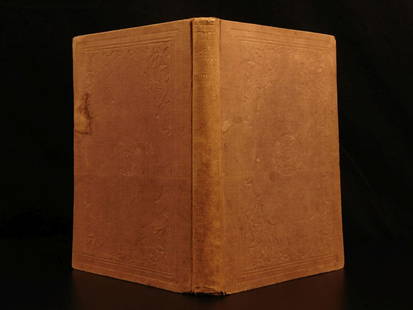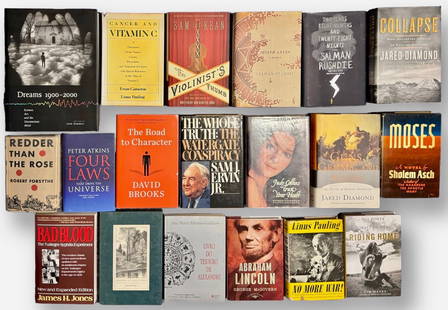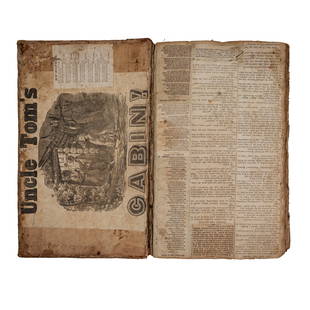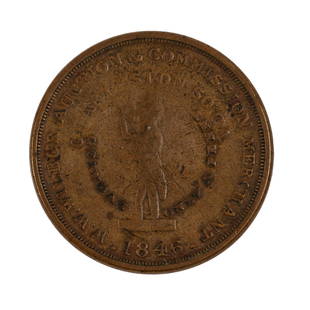
Abraham Lincoln, Under Pressure, Pardons a Partisan
Similar Sale History
View More Items in Books, Magazines & PapersRelated Books, Magazines & Papers

More Items in Books, Magazines & Papers
View MoreRecommended Collectibles
View More





Item Details
Description
Lincoln Abraham
Abraham Lincoln, Under Pressure, Pardons a Partisan Ranger
An official wartime pardon of Jacob Varner a month before Union victories at Gettysburg and Vicksburg. Lincoln backs down in the face of Virginia Governor John Letcher’s demands that he set free two partisan rangers “convicted of mail robbery” behind Union lines. Yet he is able to save face by claiming, with truth, that “the Judge, U.S. Attorney, and U.S. Marshal for the said District, the jurors before whom the said Jacob Varner was tried, and the Postmaster General of the U. States. have all petitioned that he be released from further duress…”
ABRAHAM LINCOLN. Manuscript Document Signed as President. Co-Signed by Assistant Secretary of State F.W. Seward (son of Secretary of State William H. Seward). June 1, 1863, Washington, DC, 2 pp., 10.5” x 16.75”.
Complete Transcript
[in secretarial hand:] Abraham Lincoln,
President of the United States of America.
To all to whom these Presents shall come, Greeting:
Whereas, at the April Term, 1862 of the District Court of the United States for the Western District of Virginia, one Jacob Varner was convicted of mail robbery, and sentenced to imprisonment in the Washington, D.C. Penitentiary, for the period of three years;-
And whereas, it appears that the said Jacob Varner has a wife and ten children dependent on his labor; and that in the commission of his said offence, he was the tool of more designing criminals;-
And whereas, the Judge, U.S. Attorney, and U.S. Marshal for the said District, the jurors before whom the said Jacob Varner was tried, and the Postmaster General of the U. States. have all petitioned that he be released from further duress;
Now, therefore, be it known, that I, Abraham Lincoln, President of the United States of America, in consideration of the premises, divers other good [2] and sufficient reasons me thereunto moving, have granted and do hereby grant unto him, the said Jacob Varner, a full and unconditional pardon.
In testimony whereof, I have hereunto signed my name and caused the Seal of the United States to be affixed.
Done at the City of Washington, this First day of June, A.D. 1863, and of the Independence of the United States the Eighty-seventh.
[signed in Lincoln’s hand:] Abraham Lincoln
By the President:
[signed in Seward’s hand:] F.W. Seward
Acting Secretary of State
Historical Background:
Defense lawyers for Duskey and Varner (George Duskey had in the meantime escaped) claimed that the men were war agents of the Virginia Confederate Government and that their raid on the Ripley post office, which was not denied, was a political rather than a criminal action. Nonetheless, both defendants were convicted and sentenced to prison.
In January 1863, Virginia Governor John Letcher demanded that President Lincoln recognize and treat partisan rangers, including Duskey and Varner, as prisoners of war. To underline his point, Letcher put two captured officers from the Federal Eighth (West) Virginia Infantry, Captain William Gramm and Lieutenant Isaac Wade, at hard labor as common felons in the state penitentiary. Letcher’s actions led West Virginia Governor Francis Perpont to threaten “to place double the number of rebel Virginia officers of superior and equal rank in a chain gang in Ohio Country and set them to breaking stone on the National road until those Virginia officers are released or exchanged. “The difficulty was that since Varner and Duskey were being held on criminal charges and not as prisoners of war, they could not be released or exchanged without a presidential pardon. R.J. Knotts, Jr., who has written at length about the legal travails of the Moccasin Rangers, noted that “The case in Washington batted around from Secretary of War Stanton, to Attorney General Bates, to Secretary of State Seward, to military authorities, than thence to the White House, without much result.”
The tipping point seems to have been reached when Lincoln received a petition for a pardon of Jacob Varner signed by all of the members of the jury that convicted him. The jurors explained that Varner was “an ignorant man… the victim of designing politicians who deluded such as himself into the belief of the priority of State allegiance to that of the Government of the Country.” Lincoln sent the juror’s petition to Edward Bates on June 1, 1863 with this endorsement: “As the Judge, Jury, Marshal, District Attorney & Post-Master General, join in asking a pardon in this case, I have concluded to grant it. The Attorney General will please make it out & sent it to me.” Bates returned the pardon document (countersigned by Fredrick W. Stanton, who frequently acted as Secretary of State in his father’s absence) that same day.
Varner was released from prison on 4 June, and June 13, Daniel Duskey was pardoned as well. On 1 July 1863, Captain Gramm and Lieutenant Wade were paroled and the affair of the Moccasin Ranger Raid on Ripley was finally concluded. Perhaps not coincidentally, West Virginia was officially admitted to the Union just as this issue was being settled, 20 June 1863.
WE PROVIDE IN-HOUSE SHIPPING WORLDWIDE.
Abraham Lincoln, Under Pressure, Pardons a Partisan Ranger
An official wartime pardon of Jacob Varner a month before Union victories at Gettysburg and Vicksburg. Lincoln backs down in the face of Virginia Governor John Letcher’s demands that he set free two partisan rangers “convicted of mail robbery” behind Union lines. Yet he is able to save face by claiming, with truth, that “the Judge, U.S. Attorney, and U.S. Marshal for the said District, the jurors before whom the said Jacob Varner was tried, and the Postmaster General of the U. States. have all petitioned that he be released from further duress…”
ABRAHAM LINCOLN. Manuscript Document Signed as President. Co-Signed by Assistant Secretary of State F.W. Seward (son of Secretary of State William H. Seward). June 1, 1863, Washington, DC, 2 pp., 10.5” x 16.75”.
Complete Transcript
[in secretarial hand:] Abraham Lincoln,
President of the United States of America.
To all to whom these Presents shall come, Greeting:
Whereas, at the April Term, 1862 of the District Court of the United States for the Western District of Virginia, one Jacob Varner was convicted of mail robbery, and sentenced to imprisonment in the Washington, D.C. Penitentiary, for the period of three years;-
And whereas, it appears that the said Jacob Varner has a wife and ten children dependent on his labor; and that in the commission of his said offence, he was the tool of more designing criminals;-
And whereas, the Judge, U.S. Attorney, and U.S. Marshal for the said District, the jurors before whom the said Jacob Varner was tried, and the Postmaster General of the U. States. have all petitioned that he be released from further duress;
Now, therefore, be it known, that I, Abraham Lincoln, President of the United States of America, in consideration of the premises, divers other good [2] and sufficient reasons me thereunto moving, have granted and do hereby grant unto him, the said Jacob Varner, a full and unconditional pardon.
In testimony whereof, I have hereunto signed my name and caused the Seal of the United States to be affixed.
Done at the City of Washington, this First day of June, A.D. 1863, and of the Independence of the United States the Eighty-seventh.
[signed in Lincoln’s hand:] Abraham Lincoln
By the President:
[signed in Seward’s hand:] F.W. Seward
Acting Secretary of State
Historical Background:
Defense lawyers for Duskey and Varner (George Duskey had in the meantime escaped) claimed that the men were war agents of the Virginia Confederate Government and that their raid on the Ripley post office, which was not denied, was a political rather than a criminal action. Nonetheless, both defendants were convicted and sentenced to prison.
In January 1863, Virginia Governor John Letcher demanded that President Lincoln recognize and treat partisan rangers, including Duskey and Varner, as prisoners of war. To underline his point, Letcher put two captured officers from the Federal Eighth (West) Virginia Infantry, Captain William Gramm and Lieutenant Isaac Wade, at hard labor as common felons in the state penitentiary. Letcher’s actions led West Virginia Governor Francis Perpont to threaten “to place double the number of rebel Virginia officers of superior and equal rank in a chain gang in Ohio Country and set them to breaking stone on the National road until those Virginia officers are released or exchanged. “The difficulty was that since Varner and Duskey were being held on criminal charges and not as prisoners of war, they could not be released or exchanged without a presidential pardon. R.J. Knotts, Jr., who has written at length about the legal travails of the Moccasin Rangers, noted that “The case in Washington batted around from Secretary of War Stanton, to Attorney General Bates, to Secretary of State Seward, to military authorities, than thence to the White House, without much result.”
The tipping point seems to have been reached when Lincoln received a petition for a pardon of Jacob Varner signed by all of the members of the jury that convicted him. The jurors explained that Varner was “an ignorant man… the victim of designing politicians who deluded such as himself into the belief of the priority of State allegiance to that of the Government of the Country.” Lincoln sent the juror’s petition to Edward Bates on June 1, 1863 with this endorsement: “As the Judge, Jury, Marshal, District Attorney & Post-Master General, join in asking a pardon in this case, I have concluded to grant it. The Attorney General will please make it out & sent it to me.” Bates returned the pardon document (countersigned by Fredrick W. Stanton, who frequently acted as Secretary of State in his father’s absence) that same day.
Varner was released from prison on 4 June, and June 13, Daniel Duskey was pardoned as well. On 1 July 1863, Captain Gramm and Lieutenant Wade were paroled and the affair of the Moccasin Ranger Raid on Ripley was finally concluded. Perhaps not coincidentally, West Virginia was officially admitted to the Union just as this issue was being settled, 20 June 1863.
WE PROVIDE IN-HOUSE SHIPPING WORLDWIDE.
Buyer's Premium
- 25%
Abraham Lincoln, Under Pressure, Pardons a Partisan
Estimate $10,000 - $11,000
4 bidders are watching this item.
Get approved to bid.
Shipping & Pickup Options
Item located in Westport, CT, usSee Policy for Shipping
Payment

Related Searches
TOP























![[ABRAHAM LINCOLN FORGERY]. Eugene Field II forged: [ABRAHAM LINCOLN FORGERY]. Eugene Field II forged Abraham Lincoln signature. Penned on the upper cover of: DICKENS, Charles. Dombey and Son. Philadelphia: T. B. Peterson & Brothers, [1854]. 8vo. Publi](https://p1.liveauctioneers.com/928/212515/108628851_1_x.jpg?height=310&quality=70&version=1627420959)



































![19 issues of rare Gay Magazine METRA 1985-1986: [Queer interest], Metra: Midwest America's Leading Free Gay Magazine, 19 issues, published 1986-1987, a few duplicates, softcover, staplebound wraps, illustrated throughout in black and white, publish](https://p1.liveauctioneers.com/184/328649/177016396_1_x.jpg?height=310&quality=70&version=1714770323)









![George Washington Signed Discharge: Partly printed discharge document signed by George Washington, as Commander in Chief of the Armies of the United States. Newburgh, [New York], 4 January 1783. 1 page, ## x ## in. Undersigned by Washin](https://p1.liveauctioneers.com/7226/322253/173251475_1_x.jpg?height=310&quality=70&version=1710004847)
![[Ambrotype] Texas Confederate Soldier: Sixth plate ambrotype. Full leatherette case. Portrait of a possible Texas Confederate soldier. A silver star device was used to pin up the brim of his light-toned headgear, a look often seen in image](https://p1.liveauctioneers.com/7226/322253/173251509_1_x.jpg?height=310&quality=70&version=1710004847)



![Captured Bowie Knife w/ Period Note of Provenance: Captured Confederate D-hilt Bowie knife. [Kenansville, North Carolina]: [Louis Froelich factory]. With original metal and leather sheath with affixed period notes. First note with only remnants. Secon](https://p1.liveauctioneers.com/7226/325455/175169154_1_x.jpg?height=310&quality=70&version=1712370394)

